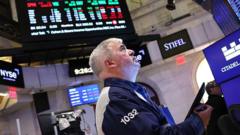As the U.S. grapples with President Trump's tariffs, parallels with Britain's Brexit experience reveal the potential long-term economic ramifications of isolationist policies.
Brexit: A Cautionary Tale for Trump's Tariffs

Brexit: A Cautionary Tale for Trump's Tariffs
Analyzing the Economic Consequences of Isolationism in Britain and the U.S.
Britain has been watching the reactions to President Trump's tariffs with a mix of disbelief and reflective concern. Following a dramatic decision in 2016 to leave the European Union, Britain initiated its own experiment in economic isolationism, and the consequences are still being assessed nearly nine years later. The parallels between Trump's tariff strategy and Britain's divorce from the EU offer critical lessons, as critics once labeled Brexit the "greatest act of economic self-harm" in the post-World War II era.
Trump’s abrupt reversal of certain tariffs last week, driven by unrest in the bond market, has drawn comparisons to Britain’s own political upheaval when Liz Truss was forced to retract radical tax cuts that had rattled investors. The bold policies stemming from the UK's choice to leave the EU have ushered in a cycle of economic uncertainty that continues to haunt the nation.
Mark Malloch Brown, a former British diplomat and deputy secretary-general of the United Nations, commented on the ongoing ramifications of Brexit, suggesting that Britain faces a significant choice: either mend its trade ties with Europe or maintain a connection with the U.S. The "breach with our biggest trading partner" looms large, according to Malloch Brown, who warns that any alliance with Europe could be a pyrrhic victory if it means severing ties with America.
As vehicles line up at the British port of Dover, bracing for further potential fallout, the lessons from Brexit may serve as an important warning to the U.S. about the drawbacks of protective tariffs and isolationist policies, encouraging both nations to reconsider their economic strategies going forward.






















